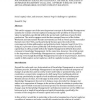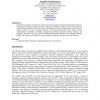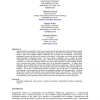SAC
2002
ACM
15 years 1 months ago
2002
ACM
Analyzing, structuring and organizing documented knowledge is an important aspect of knowledge management. In order to ease the access to text collections, in literature so-called...
115
Voted
JUCS
2002
15 years 1 months ago
2002
Abstract: In this paper, we criticise the objectivistic approach that underlies most current systems for Knowledge Management. We show that such an approach is incompatible with th...
103
click to vote
JIKM
2002
15 years 1 months ago
2002
Knowledge management as traditionally espoused has two main strands: dealing with the aggregation of knowledge and the transfer of knowledge. However this official discourse and i...
123
click to vote
JASIS
2002
15 years 1 months ago
2002
This article engages one of the most important concepts in Knowledge Management, namely, the concept of social capital, focusing upon the problem of measure and value in capitali...
107
click to vote
IRES
2002
15 years 1 months ago
2002
Knowledge Management (KM) is a field that has attracted much attention both in academic and practitioner circles. Most KM projects appear to be primarily concerned with knowledge ...
123
click to vote
INTR
2007
15 years 2 months ago
2007
This paper proposes a hybrid approach for managing knowledge within companies based on communication between people. In addition to traditional Knowledge Management Systems our co...
135
click to vote
KBS
2000
15 years 2 months ago
2000
Knowledge is an interesting concept that has attracted the attention of philosophers for thousands of years. In more recent times, researchers have investigated knowledge in a mor...
104
click to vote
ETS
2002
IEEE
15 years 2 months ago
2002
IEEE
Information technology is arguably an important tool for knowledge management, facilitating learning in a business context. However, the current use of information technology in t...
114
click to vote
ETS
2002
IEEE
15 years 2 months ago
2002
IEEE
Document management, information management, and knowledge management are three processes of an instructional knowledge management system (IKMS) that require different ways of thi...
130
click to vote
ETS
2000
IEEE
15 years 2 months ago
2000
IEEE
Organizations have long had the need to record and protect the knowledge that is their intellectual capital. However, the primary burden for knowledge management has been borne by...





